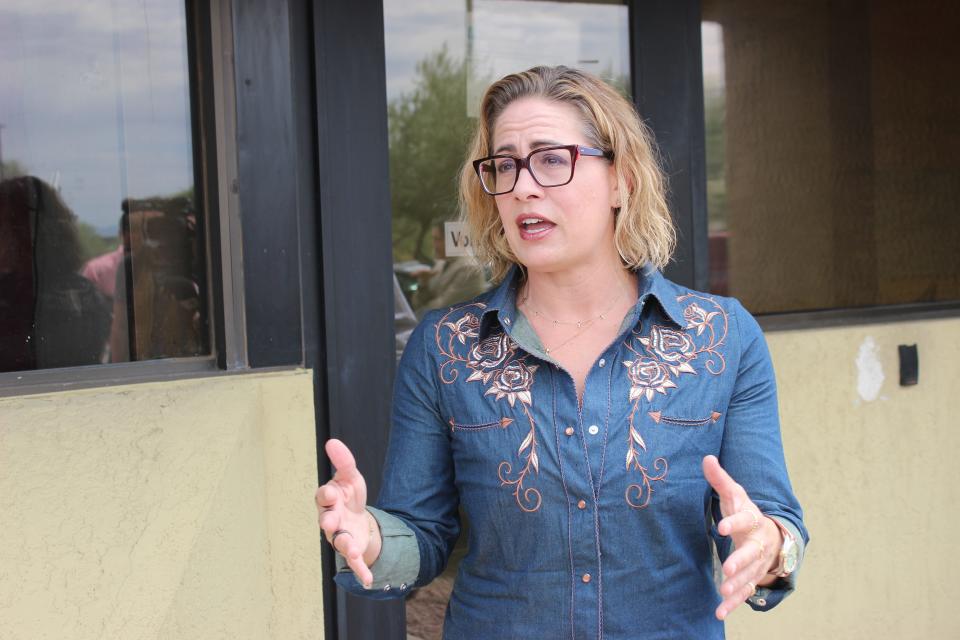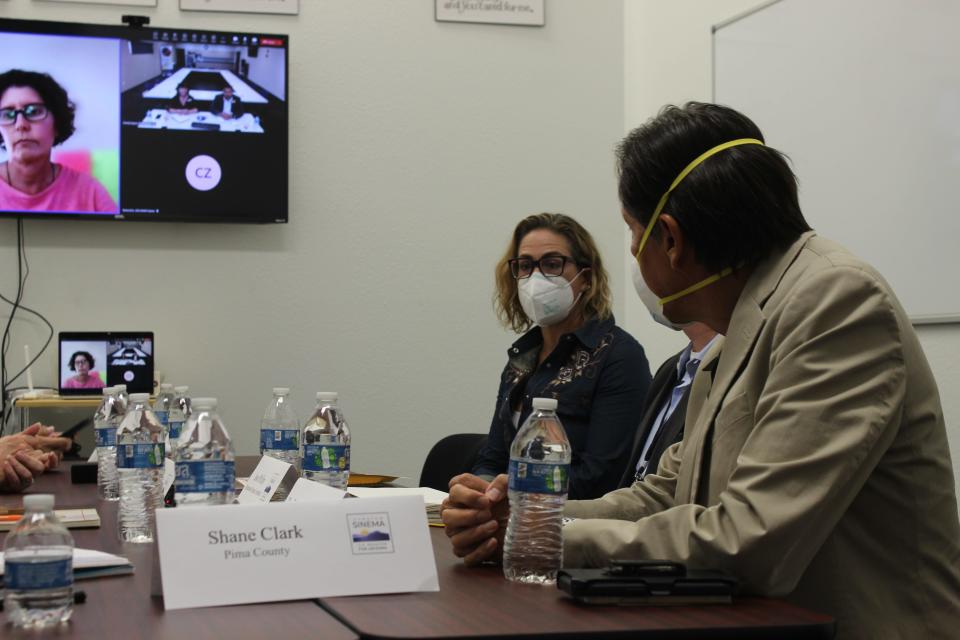Sen. Kyrsten Sinema slams White House for 'ridiculous' shortchanging of Arizona border communities
- Oops!Something went wrong.Please try again later.
TUCSON — Arizona Sen. Kyrsten Sinema blasted the Biden administration Friday for not allocating enough money toward humanitarian aid organizations along the Arizona-Mexico border.
Sinema, I-Ariz., met with representatives from various migrant aid nonprofits in a roundtable discussion at Casa Alitas’ Drexel Center in Tucson. Sinema expressed her frustration with the amount of funding that was handed out to the groups under the new Shelter and Services Program.
Sinema described the amount of funding given to Arizona as an “egregious action” that was “ridiculous” and “outrageous.” The lack of federal support is hurting nonprofits’ ability to do their job while also endangering migrant lives and harming Arizona communities, Sinema said.
“The administration completely shortchanged Arizona border communities,” Sinema said.
Sinema criticized the administration’s sluggishness in giving funds to communities that need it in real time. Fluctuations in where the majority of migrant arrivals occur along the border have changed often in recent months.
Questions raised: Federal funding process for humanitarian aid at border comes under scrutiny

Within the past 14 months, four different Border Patrol sectors have been the busiest along the Southwest border, according to U.S. Customs and Border Protection data. Before then, the Tucson and the Rio Grande sectors were the busiest for years at a time.
The Border Patrol’s Tucson Sector set a 15-year high in migrant encounters in July. The sector became the busiest along the Southwest border.
“The government has shown a real inability to respond in real time to the change in the patterns,” Sinema said. “It's a strategic choice on the part of cartels, on who they're pushing to which ports.”
Sinema said she’s working to get another round of funding approved that will go directly toward border communities.
“It has to be adequate to actually meet the needs of the border communities that are actually meeting the challenge,” Sinema said.
Teresa Cavendish, Casa Alitas executive director, also raised concerns about the Biden administration’s reported proposal to force asylum-seeking families to remain in Texas, and possibly other border communities, while they wait for their asylum screening.
The proposal is an effort by administration officials to manage the recent increase in family units arriving along the Southwest border. The families would be tracked with GPS monitoring systems, including ankle bracelets, while they wait for a decision on whether they’re able to stay in the country and continue their asylum claim.
“There are no or very, very limited resources available to support these folks,” Cavendish said.
The new program would strain shelters in Arizona that aren’t equipped to service asylum-seeking families for extended periods of time as they wait for their screening, Cavendish said. Arizona is often only a stop along the journey for most migrants who arrive in the state.
Many have family members or sponsors waiting for them elsewhere in the interior of the country.
“Anything that makes it more difficult for our families to move through as expeditiously as possible is a bad thing,” said Dr. Francisco Garcia, deputy Pima County administrator.
“It will always be a bad thing.”
Sinema said that the proposed program would cause total disruption across all of Arizona.
Housing guidance: ICE issues new guidelines for housing migrants in hotels, short-term facilities

Frustrations arise around new federal program
The federal SSP program was created to help reimburse non-governmental organizations and local governments for providing assistance to migrants, including transportation and housing. Under the previous reimbursement program, called the Emergency Food and Shelter Program, the funds were almost all limited to communities along the U.S.-Mexico border.
The new program allows for nonprofits and governments across the country to apply for reimbursement, not just those in border communities.
As a result, Arizona will only receive $5.9 million of the $77 million that the Federal Emergency Management Agency announced in the second round of funding under the program. The state has received $29.8 million of the $368 million available under the program this year.
Meanwhile, New York City has received more money than any single border state under the program, being given $106.8 million. Almost $56 million of second-round funding is slated to go toward governments and nonprofits in four states along the U.S.-Mexico border.
2024 Senate race: Why Sinema attended Biden's Grand Canyon event and why Gallego didn't
Pima County only received nearly $11 million under the program. Casa Alitas provides services in Santa Cruz and Cochise counties as well, despite only receiving SSP funds through Pima County.
Sinema, alongside Sen. Mark Kelly and Rep. Ruben Gallego, has raised concerns about the program in the past. Sinema and Kelly, D-Ariz., sent a letter to the Department of Homeland Security on Aug. 11, outlining their concerns with the program and its management.
The senators wrote that Arizona governments and nonprofits will run out of funding by early 2024 with the amount of funding allocated.
Casa Alitas is servicing roughly 750 people a day, which doesn’t include daily unannounced arrivals, according to Cavendish. The Regional Center for Border Health in Somerton is receiving roughly 350-400 people per day, according to Amanda Aguirre, president and CEO of the center.
In order to alleviate the situation, Cavendish asked Sinema to fully fund Arizona nonprofits with the money that they say they need, allowing the organizations to be nimble.
“Trust that we know how to respond, what it's going to take to respond to what comes to us, because we are the folks on the ground and have been for many years now,” Cavendish said.
Have a news tip or story idea about the border and its communities? Contact the reporter at josecastaneda@arizonarepublic.com or connect with him on X, formerly known as Twitter, @joseicastaneda.
This article originally appeared on Arizona Republic: Arizona Sen. Sinema blasts Biden administration for border aid funding

